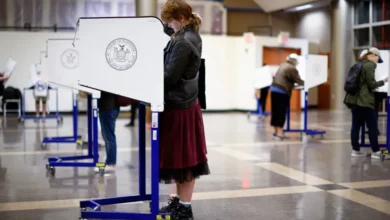US election: How will results affect wars in Gaza, Ukraine and Sudan?

As leader of the foremost superpower and so-called “world police”, whoever sits in the United States’s White House – and the decisions they make – can have a huge effect on the course of conflicts around the world.
Israel’s war in Gaza and Lebanon, the Russia-Ukraine war, and Sudan’s civil war have collectively seen hundreds of thousands killed and millions displaced. Those conflicts could worsen or end, based on Washington’s stance.
With analysts struggling to predict a clear winner before the November 5 US election between Republican candidate and former President Donald Trump and the Democrats’ Vice President Kamala Harris, it’s worth considering two scenarios.
How might a Trump or Harris White House affect major wars? Here’s what we know:
Israel’s war on Gaza and Lebanon
Harris and Trump have both been unequivocal in their support for Israel. Most Palestinians and the wider Arab world, therefore, see little prospect of the war ending with the election of either candidate. Neither has offered solutions for ending the war, however.
Trump scenario
Trump has vocally condemned the Palestinian group, Hamas, whose assault on villages and army outposts in southern Israel on October 7, 2023, ended in the deaths of 1,139 people and the capture of 251 and sparked the Israeli war on Gaza. He has expressed little sympathy for the people of Gaza: more than 43,000 Palestinians in the besieged enclave have been killed in the war in the past year.
During a meeting with Prime Minister Benjamin Netanyahu in July, Trump urged the Israeli leader to “get his victory” over Hamas. He said the killings in Gaza had to stop but that Netanyahu “knows what he’s doing”.
That rhetoric is in line with Trump’s actions during his first run as president. His government recognised the disputed city of Jerusalem
Harris scenario
Compared with President Joe Biden, Harris has been more vocal on the need to end the “inhumane” suffering of the people of Gaza, pressing for a ceasefire and a hostage deal in the immediate term.
In July, Harris told Netanyahu she would “not be silent” in the face of the suffering in Gaza. “Israel has a right to defend itself and how it does so matters. What has happened in Gaza over the past nine months is devastating,” Harris told reporters after the meeting.
Harris is also said to want peace on the Israel-Lebanon border. She praised Israel’s killing of Hezbollah leader Hassan Nasrallah in September. On Thursday, Brett McGurk, President Biden’s Middle East co-ordinator, and conflict negotiator Amos Hochstein arrived in Israel to push for a ceasefire with Hezbollah. Biden’s Secretary of State Antony Blinken has also made 11 failed missions to Israel to negotiate ending the war since October 7, 2023.
Despite her words, however, Harris has not committed to immediately halting Israel’s war on Gaza, many in the US Arab and Muslim communities note. Some say she has not laid out clear steps to achieve her goals, like cutting military support to Israel. “Without an actual commitment to stop killing the children of Gaza, I don’t care about her empathy for them,” Eman Abdelhadi, a sociologist at the University of Chicago, told Al Jazeera.
Like Biden, Harris has also stopped short of presenting a two-state plan, analysts say. Palestinian leader Mahmoud Abbas has criticised the Biden administration in the past for failing to propose a two-state system.
as Israel’s capital, sparking anger among Palestinians. He negotiated “normalisation” deals between Israel and several Arab nations under the Abraham Accords and he pulled out of the Iran nuclear deal, which Israel also opposed.
However, there was some tension between Netanyahu and Trump. In 2020, Trump presented a “Peace Plan” that entailed a two-state system with a Palestinian capital in East Jerusalem.
Palestinians condemned it for conceding too much territory to Israel. The plan ultimately fell apart after Prime Minister Benjamin Netanyahu attempted to use the moment to announce Israel’s annexing of parts of the West Bank, which Trump hadn’t agreed to. “I was so angry … that was going too far,” Trump later told the US publication, Axios.
Trump continues to speak about his plan in the run-up to the current election. In the final days of his campaign, Trump has put on a charm offensive targeting the sizeable Lebanese and Arab American voter population, especially in the key battleground state of Michigan, promising peace.










